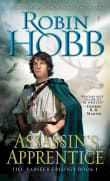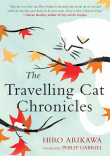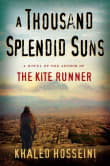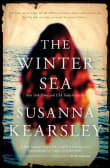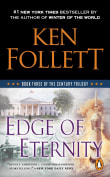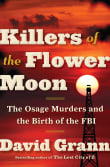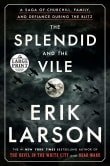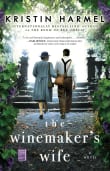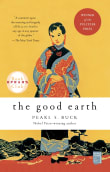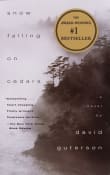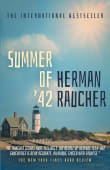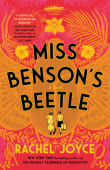Hotel on the Corner of Bitter and Sweet
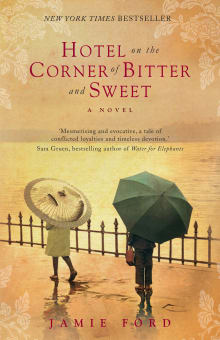
Book description
1986, The Panama Hotel The old Seattle landmark has been boarded up for decades, but now the new owner has made a startling discovery in the basement: personal belongings stored away by Japanese families sent to interment camps during the Second World War. Among the fascinated crowd gathering outside the…
Why read it?
9 authors picked Hotel on the Corner of Bitter and Sweet as one of their favorite books. Why do they recommend it?

I love fiction that takes me somewhere I don't know and reveals to me things I never knew. This story is also a tender love story: not in a schmaltzy sense, though. It tells of human cruelty and compassion, flawed and beautiful relationships, loyalty, misguided and progressive patriotism, and the ending is satisfying. The characters are well drawn and have you rooting for them. What more do you want from a novel? These are certainly things I aspire to in my own writing.

This deeply moving story took hold of my heart and didn’t let it go. Even years after having read this novel, I am still moved by the thought of it.
Struggle, war, injustice, and young love are carefully woven together in a gripping tale that speaks of truths and heartbreak we seldom examine. I can’t recommend Hotel on the Corner of Bitter and Sweet enough as it is as moving as it is important.
From Tanya's list on books that take place at a hotel.

This well-written book takes place in Seattle during the 1940s with a Chinese-American boy as the main character.
Henry Lee is best friends with a Japanese-American girl. They face much racism and prejudice, especially from Henry’s father, who disapproves of their friendship. After Pearl Harbor, the government sent all Japanese to live in internment camps, which separated Henry and Keiko for many years.
Throughout the book, we also see Henry, older, as a widower in 1986, still missing Keiko and wondering if it’s too late to reconnect.
Lots to learn from this lovely story of a turbulent time.
If you love Hotel on the Corner of Bitter and Sweet...

This book of fiction, based on facts, captured my attention from the first page, where the Panama Hotel took an older Henry Lee back to the days of WWII. It was an excellent description of the way the American military hauled Japanese American citizens to relocation facilities resembling concentration camps. For me, it was an inside look at the fear and pain experienced by people who face prejudice, as did the Chinese boy and Japanese girl. Young Henry and Keiko faced that bigotry and overcame it, despite every effort to make them hate. If those two children could do it,…
From Larry's list on capturing the imagination and making you think.

In the great American melting pot, young love often gets caught between cultures. Such is the case with Hotel on the Corner of Bitter and Sweet, a novel set in Seattle, Washington, during the onset of Japanese internment camps. American-born Henry Lee is the only child of Chinese nationalists who insist he wear a button saying “I am Chinese” to avoid being identified as Japanese—not a good thing, especially after the attack on Pearl Harbor. Henry’s schoolmate, Keiko, a third-generation US citizen, doesn’t speak the language of her Japanese ancestors. She expresses her fundamental identification with words. “I am…
From Micki's list on heart-tugging coming-of-age for aging readers.

Jamie Ford, the great-grandson of Chinese immigrants to the United States, nailed every detail in his debut novel, Hotel on the Corner of Bitter and Sweet. He crafted a gripping love story set against the backdrop of the shameful time in history during WWII when Japanese Americans were imprisoned in internment camps in Seattle. The story begins in modern-day when Henry (Chinese) finds artifacts from his youth at an abandoned hotel and relives the friendship and love he had for young Keiko (Japanese) when they were both school-aged children in the 1940s, despite all the racial barriers that existed…
From Cate's list on historical fiction for nerdy teacher-librarians.

This heartfelt and quietly moving story reminds us of the innocent lives impacted by a shameful episode in American History. In 1986, Henry Lee, a Chinese American, joins a crowd outside the Panama Hotel in Seattle’s Japantown where the owner has discovered the belongings of Japanese families who were sent to internment camps during World War II. One item belonged to a young Japanese American girl with whom Henry forged a bond of friendship and innocent love that transcended the prejudices of their Old World ancestors. He is reminded of the sacrifices he has made for family, for love, and…
From Wanda's list on narrative historical social injustice.

This book really brings home the lasting horror and heartbreak that was the Japanese internment. In the present-day storyline, Henry Lee, a Chinese American, is in the basement of the Panama Hotel in Seattle exploring recently-discovered possessions left behind by Japanese families when they were sent to internment camps. The items ignite his memories of Keiko, a Japanese American girl whom he deeply loved before she was sent away forty years earlier. Their story and separation are told in the historical storyline. The items, and the memories, help Henry forge a new relationship with his own son, and also open…
From Kelli's list on dual timelines.

This is an emotional tale about the bond of love that defies time, wars, families, social and cultural impediments. I like the historical background where the story starts – World War II – and the delicate descriptions of the harsh reality, as seen by the eyes of the children who become the main characters. The (a)symmetry of relationships is also peculiar. A boy becomes a father and has to make peace both with the memory of his father and his own attitude towards his son. The suspenseful plotting of roles of each character in the overall events gives the story…
From Iulia's list on relationships that define us across time.
Want books like Hotel on the Corner of Bitter and Sweet?
Our community of 12,000+ authors has personally recommended 100 books like Hotel on the Corner of Bitter and Sweet.


